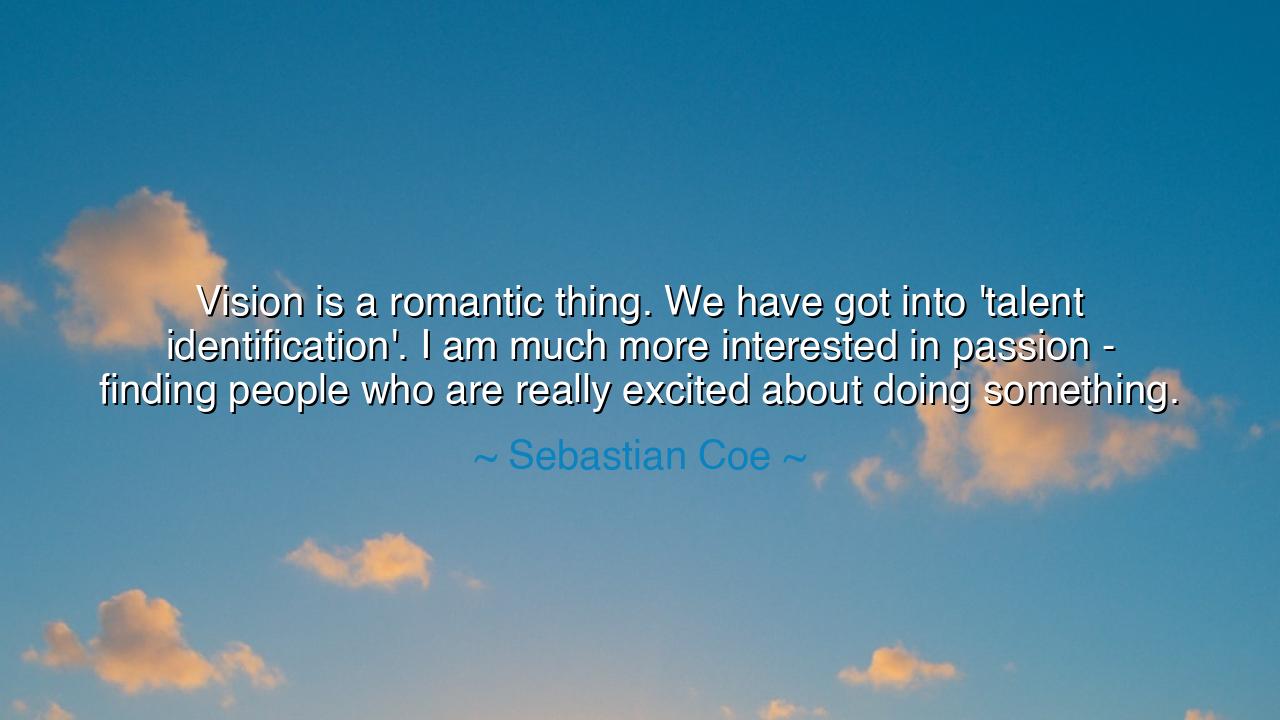
Vision is a romantic thing. We have got into 'talent
Vision is a romantic thing. We have got into 'talent identification'. I am much more interested in passion - finding people who are really excited about doing something.






"Vision is a romantic thing. We have got into 'talent identification'. I am much more interested in passion - finding people who are really excited about doing something." With these words, Sebastian Coe reveals a profound truth about the nature of success, not as a cold calculation of talent, but as the spark of passion that drives the human spirit toward greatness. In an age where we often focus on metrics and measurable skills, Coe reminds us that it is passion—that romantic force—that propels people beyond their limitations, transforming them into visionaries and leaders. Talent may be inherent, but passion is the fire that burns brightly and sustains through trials, hardships, and the inevitable moments of doubt.
In ancient times, the great heroes of myth and history were not always the most talented or the most skilled in the conventional sense. Achilles, the great warrior of Greek legend, was powerful beyond measure, but it was his passion for his comrades and his cause that made him the symbol of heroic sacrifice. His deep connection to the ideals of honor and glory, his willingness to fight not for personal gain but for something greater than himself, made him legendary. Similarly, Alexander the Great, though born with exceptional abilities, became a conqueror not because of his natural gifts alone, but because of his vision and passion to unite the world under one banner. These figures did not rise because of what they were born with, but because of the passion that ignited within them a purpose and drive that could not be quelled.
In modern times, this same principle holds true. The best athletes, leaders, and innovators are not always the ones with the most obvious skills or natural abilities, but those who are driven by an unyielding passion to pursue their dreams. Passion is what sets apart the person who practices tirelessly, the writer who spends hours crafting each word, and the entrepreneur who sacrifices comfort to bring a vision to life. Talent identification, while important, is not enough. For talent, when left unchallenged or uninspired, will wither. But passion—passion, in all its forms—can move mountains. It transforms mere effort into a calling, something greater than the sum of its parts.
Consider the story of Thomas Edison, whose inventions have forever changed the world. He was not the most naturally gifted or the most academically accomplished inventor, but his relentless passion for invention fueled his persistence. He famously said, "Genius is one percent inspiration and ninety-nine percent perspiration." Edison’s vision for the future of technology came not from talent alone, but from an unshakable drive to innovate, to solve problems, and to better the world around him. His ability to stay passionate and motivated despite countless failures is what ultimately led to his monumental success. His story is a living testament to the truth that passion, more than talent, is the true driving force behind achievement.
Coe's perspective challenges the modern obsession with talent identification—an approach that seeks to categorize and label individuals based on their abilities, rather than their potential. Talent identification assumes that success can be predicted, but in reality, it is the passion behind that talent that determines whether an individual will persevere when faced with hardship. Just as an athlete may have the physical attributes for greatness, it is their passion that will carry them through the grueling hours of training, the moments of failure, and the inevitable setbacks along the way. Talent may open the door, but passion will keep the door open.
The lesson here is simple: vision—the ability to see something greater than oneself—is a romantic and powerful force. It is what fuels the pursuit of greatness, turning obstacles into opportunities. When we seek to recognize potential in others, we must look beyond the surface, beyond the tangible measurements of talent. Instead, we should seek those who are ignited by a deep passion for their work, who carry within them a vision that compels them to keep moving forward, even in the face of adversity. Talent is the starting point, but passion is what fuels the journey.
In our own lives, let us remember the power of passion. Whether in our careers, relationships, or personal pursuits, it is the fire of our passions that will sustain us. Let us cultivate that inner spark and be willing to chase our vision, not for recognition or reward, but because we are driven by something greater. In doing so, we will find not only success but fulfillment, and ultimately, a life lived in alignment with our truest purpose. The world may place emphasis on identifying talent, but it is passion that transforms talent into something extraordinary. Find what excites you, and let that passion lead you to places you never dreamed possible.






AAdministratorAdministrator
Welcome, honored guests. Please leave a comment, we will respond soon